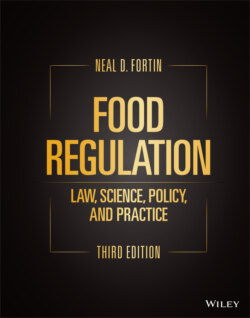Читать книгу Food Regulation - Neal D. Fortin - Страница 277
5.5 AUTHORITATIVE STATEMENTS – FDA MODERNIZATION ACT
ОглавлениеBefore the Food and Drug Administration Modernization Act of 1997 (FDAMA), companies could not use a health claim or nutrient content claim in food labeling unless the FDA published a regulation authorizing such a claim. Two new provisions of FDAMA28 permitted distributors and manufacturers to use claims if based on current, published, authoritative statements from certain federal scientific bodies. The National Academies of Sciences (NAS), the National Institutes of Health (NIH), and the Centers for Disease Control and Prevention (CDC) are federal government agencies specifically identified as scientific bodies by the FDAMA.
FDAMA’s provisions were intended to expedite the process by which health claims can be established and used. FDA interpreted “authoritative statements” so that they must reflect a consensus within the identified scientific body and be based on a deliberative review by the scientific body of the scientific evidence. In theory, the authoritative‐statement standard is slightly less stringent than FDA’s prior requirement for “significant scientific agreement.” Particularly, FDAMA allows companies to notify FDA of their intent to use a new health claim based on an authoritative statement of only one federal scientific body, rather than show scientific agreement. However, in application, the standards show little difference.
From a process standpoint, FDAMA does require that FDA expedite review. FDAMA gives FDA 120 days to respond to new health claim proposals based on authoritative statements. If the agency does not act to prohibit or modify the claim within that time, the claim can be used.
Nevertheless, FDAMA’s provisions to expedite approval did not meet the desires of everyone in the food industry. FDAMA sped up FDA’s review, but review often resulted in denial. Two years after FDAMA, two food marketers sued over such a denial. The result was the landmark case, Pearson v. Shalala, which is discussed later in this chapter.
FDA has prepared a guide on how a firm can make use of authoritative statement‐based health claims.29 FDAMA does not include dietary supplements in the provisions for health claims based on authoritative statements. Consequently, this method of oversight for health claims cannot be used for dietary supplements at this time.
As this was written, three health claims based on authoritative statements were approved30:
Whole Grain Foods and Risk of Heart Disease and Certain Cancers
Potassium and the Risk of High Blood Pressure and Stroke
Whole Grain Foods with moderate fat content and heart disease31
